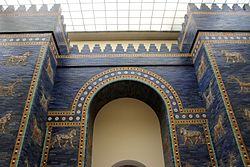
Back تاريخ العراق Arabic تاريخ العراق ARZ Historia d'Iraq AST İraq tarixi Azerbaijani Ираҡ тарихы Bashkir ইরাকের ইতিহাস Bengali/Bangla Història de l'Iraq Catalan مێژووی عێراق CKB Dějiny Iráku Czech Hanes Irac Welsh
| History of Iraq |
|---|
 |
|
|
Iraq, a country located in West Asia, largely coincides with the ancient region of Mesopotamia, often referred to as the cradle of civilization. The history of Mesopotamia extends back to the Lower Paleolithic period, with significant developments continuing through the establishment of the Caliphate in the late 7th century AD, after which the region became known as Iraq. Within its borders lies the ancient land of Sumer, which emerged between 6000 and 5000 BC during the Neolithic Ubaid period. Sumer is recognized as the world’s earliest civilization, marking the beginning of urban development, written language, and monumental architecture. Iraq's territory also includes the heartlands of the Akkadian, Neo-Sumerian, Babylonian, Neo-Assyrian, and Neo-Babylonian empires, which dominated Mesopotamia and much of the Ancient Near East during the Bronze and Iron Ages.
Iraq was a center of innovation in antiquity, producing early written languages, literary works, and significant advancements in astronomy, mathematics, law, and philosophy. This era of indigenous rule ended in 539 BC when the Neo-Babylonian Empire was conquered by the Achaemenid Empire under Cyrus the Great, who declared himself the "King of Babylon." The city of Babylon, the ancient seat of Babylonian power, became one of the key capitals of the Achaemenid Empire.
In the following centuries, the regions constituting modern Iraq came under the control of several empires, including the Greeks, Parthians, and Romans, establishing new centers like Seleucia and Ctesiphon. By the 3rd century AD, the region fell under Persian control through the Sasanian Empire, during which time Arab tribes from South Arabia migrated into Lower Mesopotamia, leading to the formation of the Sassanid-aligned Lakhmid kingdom. The Arabic name al-ʿIrāq likely originated during this period. The Sasanian Empire was eventually conquered by the Rashidun Caliphate in the 7th century, bringing Iraq under Islamic rule after the Battle of al-Qadisiyyah in 636. The city of Kufa, founded shortly thereafter, became a central hub for the Rashidun dynasty until their overthrow by the Umayyads in 661.
With the rise of the Abbasid Caliphate in the mid-8th century, Iraq became the center of Islamic rule, with Baghdad, founded in 762, serving as the capital. Baghdad flourished during the Islamic Golden Age, becoming a global center for culture, science, and intellectualism. However, the city's prosperity declined following the Buwayhid and Seljuq invasions in the 10th century and suffered further with the Mongol invasion of 1258. Iraq later came under the control of the Ottoman Empire in the 16th century, remaining under Ottoman rule until the end of World War I, after which Mandatory Iraq was established by the British Empire. Iraq gained independence in 1932 as the Kingdom of Iraq, which became a republic in 1958. The modern era has seen Iraq facing challenges, including the rule of Saddam Hussein, the 2003 invasion of Iraq, and subsequent efforts to rebuild the country amidst sectarian violence and the rise of the Islamic State. Despite these difficulties, Iraq plays a vital role in the geopolitics of the Middle East.